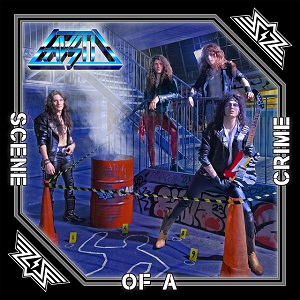ALBERT BOUCHARD – “Imaginos Is A Human, But Is Also A Bird – And Also A Fish”
November 26, 2020, 4 years ago

Did ancient alien beings, now living as aquatic monsters, cause World War I through a series of human and non-human manifestations taking place from across the 1800s?
Blue Öyster Cult manager and lyricist Sandy Pearlman opined thusly, in the late ‘60s, then some more in the ‘70s across various BÖC songs and then into an album called Imaginos in 1988. At his side, always, was ex-BÖC drummer Albert Bouchard, who took the most interest in Sandy’s mad and circuitous tale, to the point where Imaginos had first been conceived as an Albert Bouchard solo album. Now, 32 years after the ill-fated Imaginos album, Albert has realized his goal of arranging the story the way he’d meant it to be, even if Pearlman is no longer around to enjoy the fruits of their shared labours, having succumbed to an aneurism in 2016.
The record, out now on Deko Entertainment, is called Re Imaginos, and yes, it completes the circuit from the 1988 record assigned bluntly to the band, through Albert’s demos readily available on YouTube, with all of us now winding up with this intriguing and unexpectedly quiet telling of the tale here in 2020.
Re Imaginos, explains Albert, is a correction of sorts. “Right. What happened was, I got the idea because after the original one came out, with BÖC playing it, I was disappointed that they left off a couple of songs and some other stuff, and then they didn’t really play any of the songs live. So I thought, at that time, well, I’m just going to go out with a band and play the songs. But it was harder than I imagined, because the arrangements were so elaborate. There were so many things in there—synthesizers and all this other stuff—that I couldn’t really figure a way to re-create it. So with this version, I decided that I was going to play all the rhythm guitar parts on acoustic guitar. So if I had to, I could just walk into a bar and play the whole album—all by myself. So that’s how it started.”

“And then I started doing some live streams with my band—Justin Robinson and Dave Hirschberg—and people liked it when I played those Imaginos songs. So that’s another thing that made me think, oh, okay, this is a good concept. And then the more I thought about it, the more I thought, well, actually, that’s what Sandy really wanted in the beginning. One of the things about this record that was different from a lot of the other records is that Sandy actually had a hand in writing the music too. I think I have tapes of him singing some of the parts, which is interesting. I was thinking about it this morning. On the original record, he sings the ‘Hey’ in ‘Del Rio’s Song’ (ed. this is now called ‘Del Rio Song’).”
“But then I thought, well, this is kind of sparse compared to the BÖC version,” continues Albert. “So I decided that I needed to add a few things. But I was still trying to keep it as simple as possible, and make all the instruments acoustic instruments, or emulating an acoustic instrument. Like, for instance, on ‘Del Rio Song’ which was the first song we really recorded with the band, Mookie Thomas played keyboards, and she played basically synthesized strings. So I said, okay, that works for me. And also, at the same time, I was listening to a record that both Sandy and I really loved a lot, which was Love’s Forever Changes. I was listening to that going, oh, what makes this record so great? One of the things is the songs, of course, but you’ve got Arthur Lee’s voice and Brian MacLean’s voice, those two voices singing the leads on the songs, and you had strings, arranged by Bruce Botnick. And then you had trumpets. And I thought, oh, okay, you know, during the lockdown, my brother (ex-BÖC bassist Joe Bouchard) had been getting his trumpet chops back together. Actually, it was before that. It was when we were making Eleven Even with Blue Coupe. He brought a trumpet to one of the practices and we’re saying gee, he sounds really good, like a legit trumpet guy. So after we did the tracks, I asked him to play some trumpet leads on ‘Imaginos’ and ‘Black Telescope.’ And that was interesting. I got a chance to do the two songs that were left off of BÖC’s Imaginos, which were ‘Gil Blanco County’ and ‘Black Telescope.’”
Interesting, but way back at the beginning, before the Cultsters found Eric Bloom, Sandy, penner of the Imaginos “mythos,” was briefly floated as potential singer for the band, sayer of his own truths, so to speak.
“Actually, that’s absolutely true, yes,” says Bouchard. “Both him and Richard Meltzer. But his voice was… do you remember Pavlov’s Dog? His voice sounded like that: super-high, fragile, nervous. His pitch was not bad, but his timing was terrible. And really, it wasn’t heavy enough, for us, at that time. That’s what we thought. So that’s another thing about this version of Imaginos, is that on some songs I change the key. Because I felt like it was too high for me to sing comfortably, and to sing the way that I thought that the character should be singing. And then other songs, a lot of them I kept in the same key. But instead of singing them like me, I tried to sing them like Sandy Pearlman, like the high, nervous kind of falsetto thing. And I was pretty happy with that. I was thinking, Sandy, if he was alive, he would be singing this—I would make him sing them (laughs). But unfortunately he’s not. I’m sure that he would be happy to be doing this, because he was just as disappointed with the sales of the 1988 album that I was. You know, I knew there was no hit on it. It wasn’t supposed to have a hit. It was supposed to be like a piece you listen to all the way through. Back in the old days, you know, it was album-oriented radio. Now of course they changed the meaning of AOR to adult-oriented (laughs).”

I asked Albert if his conception of Imaginos as a character in this story has changed over the years. Who is he? What does he look like?
“Ah, well, Imaginos is a shape-shifter,” figures Bouchard. “And he’s not even always a human. In the song ‘Imaginos,’ Imaginos is a human, but is also a bird—and also a fish. And in ‘Black Telescope’ Imaginos is a bug. You know, something that looks like an earwig except cuter (laughs). And in ‘Blue Öyster Cult’ Imaginos is an alien, or you know, possessed by aliens, alien creatures. And ultimately, you know, in the Mutant Reformation, which is the last of the series, Imaginos turns into an alien—Imaginos is an alien. That’s part of the ending of the story. So, spoiler alert (laughs).”
Enthused about moving through a part II and a part III, Albert says that, “The reaction to this has been so great. I can’t tell you… it’s like amazing. They did up like a thousand copies and they’re sold out and they had to go to a second printing already. And now they’re saying, ‘Well, you know what? We’re going to put it out as a double vinyl record.’ Which is great. Because that’s exactly what I wanted in the very beginning. Because it wasn’t CDs then. I got the original album on a vinyl record and it sounds like crap, because they were trying to fit 48 minutes on a record that you only want to have 37 minutes at the most. So the songs, in the grooves, they sounded terrible. And ‘Imaginos,’ especially; I thought, ‘Oh, this is just awful—awful.’ I never… even to this day, I can’t stand to listen to that song. And when it came out, they left off ‘Girl That Love Made Blind’ and ‘Gil Blanco County,’ which I understand, because ‘Gil Blanco’ was already going to come out. It’d already been recorded with (pre-BÖC band) Stalk-Forrest Group. But ‘Girl That Love Made Blind’ was way better than ‘Imaginos.’ But ‘Imaginos’ was, of course, the title cut. I left messages for Sandy, like, ‘Why did you leave that out? “Imaginos” is terrible!’ And he never replied. He was mad at me at that time, because I was suing him.”
Back to the idea of a correction, two things are of import here, in the eyes of Albert. First, Sandy had wanted these songs to sound quieter, almost like “nursery rhymes.” This has been achieved. Second, Albert wanted to work on the sequencing of the tracks so the story made more sense.

“When we were doing Imaginos, he wasn’t coming up with anything new,” recalls Bouchard. “I mean, we were laser-focused on getting this batch of songs out there, so that people could get the gist of the story. Because all the other times it was just… it was okay that we didn’t do the whole thing right away. Because it enhanced the mysterious nature of the songs. But we had a big disagreement, also, when we were making it, where I was trying to make more sense out of the story line. So here I kind of do all the stories in chronological order.”
“But he was not into that,” says Albert in closing. “And that’s when he came up with, well, it’s random access. Because computers were just starting to take over our lives at that point. So it’s a random access myth. Which, I never really bought into that much. So now I was like, okay, I’m gonna make a correction. I’m gonna do it the way I think it should be on this new record, which is chronological. But as I did it, I realized, wait a minute, no, it doesn’t have to be strictly chronological. Because the songs refer back to each other all the time. So that part isn’t that important. Although I think there should be a loose kind of time arc to the story. I’ve been watching this German TV series called Dark, where it’s all about time-travel. And I mean, I think, in the show, there’s a cave that you can go in where you can jump time, and there’s also… someone is making a time machine, so they can get back to wherever they ended up when they went through the cave, or whatever. It’s pretty interesting. And it has all of these time paradoxes that you would have, if time-travel was a reality. And really, maybe it is—who knows?”











